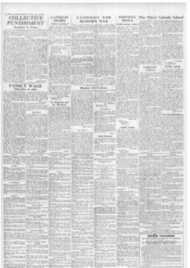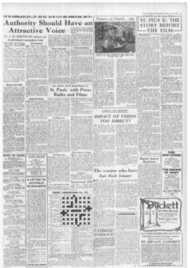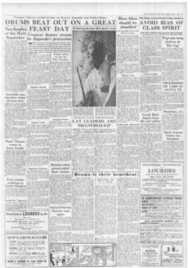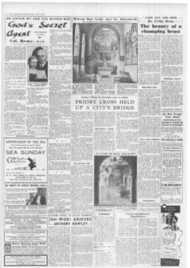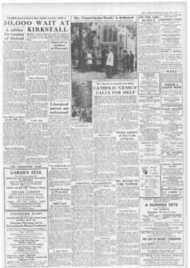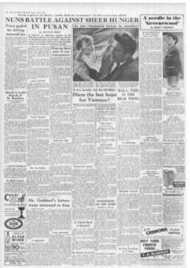Page 5, 2nd July 1954
Page 5
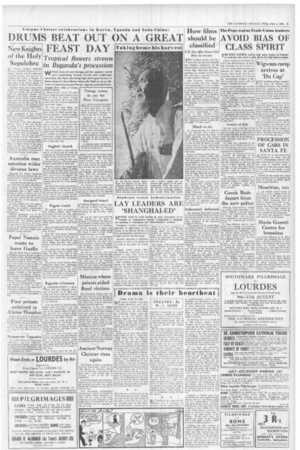
Report an error
Noticed an error on this page?If you've noticed an error in this article please click here to report it.
Tags
Share
Related articles
Odyssey Through Dublin
In Dublin's Fair City
The Abbey At Ease
Best-loved
From Bloomsday To Doomsday
Drama is their heartbeat :7
THEATRE: By W. J. IGOE
CORK, JUNE 25, 1954
WE came to Dublin a few days Iry before Bloomsday and I foregathered with a convivial batch of the faithful in the Anna Livia Room a few yards from the place where the O'Connell Bridge spans the bosom of the lady herself. The fatuous ingenuity of Chance had arranged it so that every theatre in the capital closed. But there is a unique dramatic ferment in Ireland that always is about to explode or has just thrown up something of interest.
Among the Joycean elders assembled at the bar was a young playwright whose work was being discussed in the city. Dr. Lennox Robinson's first new play for many years, The Demon Lover. was in rehearsal and about to he produced at the Gaiety. Mr. Cyril Cusak, abroad in London to play Stephen Dedalus on the Third Programme's Bloomsday selection from UlysseA, with Mr. Liam Redmond as Leopold Bloom himself—surely brilliant casting in both parts— was gathering the company which he has since presented in The Playboy of the Western World at the Sarah Bernhardt Theatre in Paris.
On the leader page of The Irish Press my friend Joe Tomelty was proclaiming that what the Irish theatre needs is more good writers of one-act plays. The atmosphere of Irish conversation about the theatre suggested to me, on the other hand, that what the English theatre needs is something of the zest one finds in Ireland.
TO drift for a moment to Cork and the Opera House where—Chance, that old bowsie, playing another of his tricks—I saw Dial M from Murder. "straight from the West End,Mr. Knott's thriller, smooth and as beautifully constructed as a good clockwork toy, satisfies the requirements of Mr. Carl Climes aim during his summer season in Cork. It is splendid entertainment and his capable company made the most of its alarms, shocks and sinister humours.
But the striking thing in the Opera House was the audience which had come to be entertained and must have warmed the hearts of the actors on stage. Reviewers become, or think they have become. authorities on audiences, The people in the Opera House made the average London audience seem like a group of displaced persons waiting for a train to take them to an unknown destination —wan, lacklustre, underfed, halfdead, dressed up and nowhere to go.
Every movement of an actor got its response. A good cross-section of the people of Cork were in the theatre, One had a glimpse of what is meant by that abused expression. "a people's theatre."
During the past few months, Cork has seen grand opera, Oiliello, with Hilton Edwards, Mac Liarnmoir and Mrs. Cusack in the leading roles, and the work of the new. to me, Irish dramatist Padiaig Fallon. who adapts classical themes to contem• porary Ireland. It is in like cities that any national theatre must be judged: I doubt if any eompalable place in England has seen a richer mixture or one as stimulating during the past few months D UT Dublin is the centre of Irish ',theatre, and it embraces the European, national and provincial in
an unself-conscious manner that is
delightful. Dr. Robinson's play, for example, which is, as I write, subject of some controversy among Irish drama critics, attempts the interesting feat of wedding a Strindbergian theme to contemporary Irish life, using a Nobel prize-winner as its central character.
At the Gate there is a revival of an lath century comedy, Arthur Murphy's All In The Wrong. A few weeks ago the Abbey dosed after a presentation of Mr. Tomelty's new play, which deals with the place of the priest in the Irish community; and Dubliners, not normally frantic in their praise of themselves or their neighbours, had kindly and appreciative words for their compatriots from the north who actectin this play.
One is aware that responsible Irish critics are disturbed by the influx of some sad rubbish from the West End, Dublin having been chosen as one of the cities upon which English managements inflict picliminary runs of plays due for presentation in the metropolis. The attitude of these Irish critics is understandable. But the outsider, listening to Irish talk about the theatre, is inclined to feel their fears will be. in the long run, groundless.
Irish theatre seems very much itself, national, reflecting the life of the parish and the city, rooted in its own classics and Shakespeare and the Greeks. aware of Europe and developments abroad. It is not backed by combines and must earn its own living; consequently it lives its own Currently in Dublin, apart from Dr. Robinson's work and the Murphy revival, one may see French ballet and the cosmopolitan vaudeville some of us dislike. Dublin represents Ireland and, at the same time, being a capital, it must reflect the wider world, which spawns crooners. Its theatre is alive. It is even news. I doubt if any other capital in the Western World gives time, for example. on radio, on the evening after a first night, to drama critics' reviews of current productions.
Listening, the other evening, to Gabriel Fallon's cool, wise and informative appraisal of the French ballet and the controversial and pointed comments of his colleagues on The Demon Lover, one was aware that the audience for this drama criticism must measure LT to its exponents. The thought suggested that the hearts of those who work in the Irish theatre must be high,
blog comments powered by Disqus



